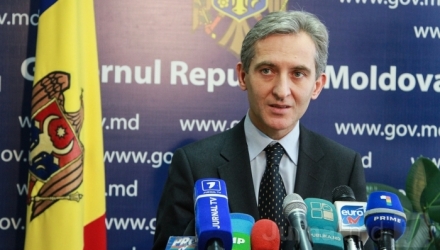
Can Russia Derail Moldova From the European Course?
Publication: Eurasia Daily Monitor Volume: 11 Issue: 32
By:

Russia’s successes in derailing the European Union’s association agreements with Armenia and with Ukraine have raised concerns about a possible repeat success for Russia in Moldova. Toward that goal, the Kremlin seems set to exploit Moldova’s parliamentary election campaign, which started in the second week of February at full throttle (Unimedia, February 14, 15).
Initialed at the EU’s Vilnius summit in November 2013, the EU-Moldova association and free-trade agreements are due for signing by August 2014 (instead of late 2014/early 2015, i.e. after Moldova’s parliamentary elections, as the EU had originally envisaged). Once signed in August, the agreements can quickly be ratified by Moldova’s incumbent parliament, preempting the parliamentary elections which are due in November.
The current debates in Chisinau and Brussels focus on Russia’s coercive instruments and other forms of negative leverage, by which Russia could disrupt the EU-Moldova agreements’ signing and ratification. Those debates could gain in predictive value by assessing whether Russia could also bring “positive” incentives to influence Moldova.
When Russia stopped Ukraine from signing the association agreement in Vilnius, the EU’s response overemphasized Russian pressures and “blackmail.” It did not duly consider the “positive” incentives by which Russia managed to sway the Ukrainian government’s choice (see EDM, January 22). Europe seems, in the meantime, to have at least partly rectified that imbalance in the analysis, acknowledging the effectiveness of Russian carrots, which the EU had no plans or means to match in Ukraine.
Russia did apparently use unadulterated “blackmail” on Armenia. The Kremlin threatened to no longer guarantee Armenia’s territorial gains versus Azerbaijan, if Armenia had committed to association with the EU. But Yerevan acted as a consenting victim: the government and political forces across the board promptly concluded that association with the EU was less valuable than having Russia fully on Armenia’s side in that “frozen” conflict (see EDM, September 11, 2013).
That cumulative experience (consummated in Armenia, ongoing in Ukraine) directly bears on Moldova’s case. Russia’s capacity to influence Moldova’s opinion trends, election outcomes and, ultimately, governmental decisions must be assessed as a function both of pressures and of inducements that Russia could deploy. Coercion and pressures would not by themselves work effectively, and could even backfire, unless combined with palpable incentives in a two-pronged Russian effort to pry Moldova off its European course.
Assessed in that light, Russia’s attempts to compete against the European Union in Moldova are likely to prove ineffective (barring serious mistakes in Chisinau). Russia’s policy looks one-dimensional, with threats of punitive economic measures not accompanied even by hints at rewarding Moldova for any concessions. Moldova has made one significant concession thus far: it handed over Chisinau International Airport to Kremlin-friendly Russian businessmen. This was the work of a Moldovan governmental faction that had opposed then-prime minister Vlad Filat and ultimately forced him out (see EDM, October 9, 10, 2013). Moscow has simply pocketed that concession. It has shown no carrots for Chisinau thus far.
One scenario with a winning potential for Russia in Moldova could result from a spread of chaos in Ukraine, if that country’s southeast (“Novorossiya”), just across Moldova’s border, were to slide into Russia’s orbit. This could bridge Russia de facto with Transnistria and Moldova in terms of Russian military access and gravitational pull of the Russia-led Customs Union. It would also shift Moldova’s internal politics in Russia’s favor. Such a cataclysmic Ukrainian scenario had rightly been ruled out with fairly high confidence during the last two decades, until political violence and elements of parallel power were unleashed in Ukraine in recent weeks.
In this new situation, the hypothetical possibility of Ukraine’s unraveling gives cause for deep, if muted, concern in Chisinau and not only there. A cohesive and effective government in Kyiv seems a more remote possibility than the alternatives: either continuing disorder, or a return to drift in a Ukraine more debilitated than it was. As the Moldovan analyst Victor Chirila observes, “If the European Union loses Ukraine, that will also be Moldova’s loss. Russia would not limit itself to [turning back] Ukraine only” (Unimedia, February 5).
Against this backdrop Moldova’s coalition government is entering the parliamentary election campaign, focused on mobilizing support for the European choice. For their part, the Communists are coalescing with hardline Russophile groups to defeat that choice and re-orient the country toward Russia (“Eurasian Union”). The electoral campaign will be bipolar and confrontational.
The Liberal-Democrat Party is the coalition government’s mainstay (numerically as well as policy-wise) and the only major pro-Western force in Moldova. Its rival within the coalition, the Democratic Party, has an ambiguous record on European affairs, is beholden to billionaire Vlad Plahotniuc’s interests, and (partly for this reason) trails behind in the popularity ratings. European officials have continually patched up the marriage of necessity between these two parties against the Communists. The coalition government’s smallest component, the splinter Liberal-Reformer Party, is firmly pro-Europe. It seriously risks losing its parliamentary seats to the anti-government, Romanian-irredentist Liberal Party, from which the Liberal-Reformers split.
Liberal-Democrat Party leader and former prime minister (2009–2013), Vlad Filat, launched the party’s electoral campaign with a series of events dedicated to local governance in districts and towns. The party issued an appeal to the country to adopt an “irreversible course toward the EU and a European Moldova” (Moldpres, February 10). Filat’s successor as prime minister, Iurie Leanca, launched a similar appeal on the government’s behalf in opening the parliament’s 2013 session. “We will win the elections and sign the EU Association agreements,” Leanca vowed repeatedly in response to Communist taunts (Moldpres, February 14).
This party will bear the brunt of efforts in this campaign to elect a pro-Europe majority to the next parliament. The Liberal-Democrats’ coalition partner/rival, the Democratic Party, is not internally united around a European agenda; and will tactically dilute the European message in hopes of wooing Communist voters with a middle-of-the road message. The electoral campaign’s defining conflict is pitting the Liberal-Democrat Party against the Communists and their local allies, with Russia almost certainly considering ways to influence the outcome in its favor.




